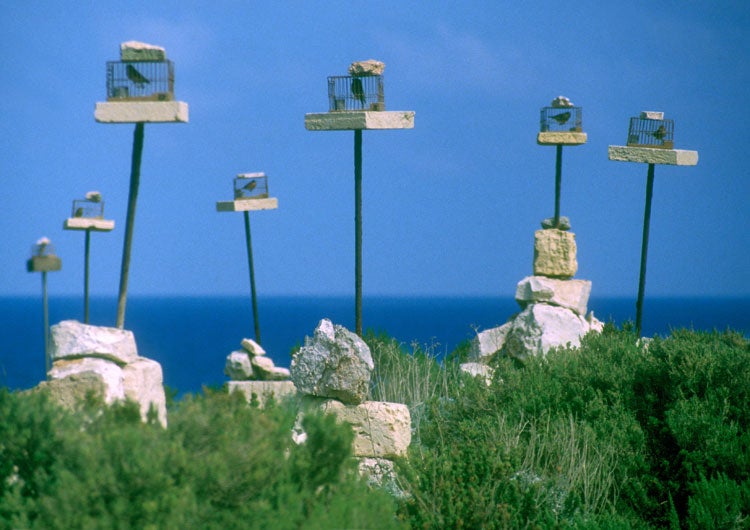Conservationists mobilise to halt mass slaughter of birds in Malta

Your support helps us to tell the story
From reproductive rights to climate change to Big Tech, The Independent is on the ground when the story is developing. Whether it's investigating the financials of Elon Musk's pro-Trump PAC or producing our latest documentary, 'The A Word', which shines a light on the American women fighting for reproductive rights, we know how important it is to parse out the facts from the messaging.
At such a critical moment in US history, we need reporters on the ground. Your donation allows us to keep sending journalists to speak to both sides of the story.
The Independent is trusted by Americans across the entire political spectrum. And unlike many other quality news outlets, we choose not to lock Americans out of our reporting and analysis with paywalls. We believe quality journalism should be available to everyone, paid for by those who can afford it.
Your support makes all the difference.It is Europe's worst and most senseless wildlife massacre, resulting in the annual death of thousands of birds about to breed all over the continent. But this spring, conservationists are heading for the Mediterranean to help end it.
The Maltese bird hunt, a mass slaughter of spring migrant birds, has been illegal since the island joined the European Union in 2004, but the government has allowed it to continue in spite of the new rules.
Huge numbers of birds migrating from Africa to Europe, such as turtle doves, are killed by hunters as they pass over or stop in Malta during their crossing of the Mediterranean, even though spring hunting has been outlawed throughout Europe since 1979 by the EU's birds directive. Thousands of other birds, such as finches, are taken by bird trappers.
The Maltese government, in deference to the country's powerful hunting lobby, has failed to enforce the directive, and is now in trouble with Brussels. Last month the European Commission announced that it was taking Malta to the European Court over the issue. And the island's bird protection body, BirdLife Malta, is taking its own action by setting up a Spring Watch Malta conservation camp of volunteers from across Europe who will document the activities of the hunters and bring them to the attention of the world.
Bird lovers from Britain and countries as far away as the United States are expected at the camp, which will run from 12 to 29 April, the height of the migration season. "We want to put the Maltese government and Maltese hunters under scrutiny by having people in the field observing," said Alistair Gammell, international director of the Royal Society for the Protection of Birds, which is co-ordinating the efforts of British volunteers.
"Malta, which is regarded as having the worst bird protection reputation in Europe, has repeatedly refused to comply with European bird hunting and trapping laws. The world needs to witness what's going on.
"To shoot birds when they are returning on migration and on the point of reproducing the species is just senseless. It's hugely destructive."
Volunteers will go into the field each day with BirdLife Malta staff to document both the migration and hunting activities. The situation with regard to the hunters is tense: threatening messages from hunting supporters have been posted on websites, and this month three cars belonging to BirdLife Malta volunteers were set on fire. Activists at the Spring Watch Malta camp will be told to avoid confrontation.
The indiscriminate hunting of birds in Malta has been an issue with European conservationists for at least 30 years, as the island's 15,000 obsessive shooters and bird trappers (out of a population of 400,000) have taken a gigantic toll of bird life.
As a result, many of the species that once were resident on the island, from barn owls to peregrine falcons, have been wiped out.
But even more important, from an international point of view, is the huge toll of migratory birds passing through or over the island from their wintering grounds in Africa to their breeding grounds across Europe.
In his book, Fatal Flight: The Maltese Obsession with Killing Birds which chronicles the history of Maltese hunting, Natalino Fenech described the annual death toll of three million finches, more than half a million thrushes, 500,000 swallows, 80,000 golden orioles, 18,000 shearwaters and 50,000 birds of prey.
Time was called on the slaughter when Malta became a member of the EU in 2004 and it became subject to EU laws under which the hunting of spring migrants is banned. But such was the strength of the hunting lobby that for the past three springs the Maltese government has declared a legal season of its own in defiance of Brussels.
This has now landed it in the dock. All parties are waiting to see if the government takes its defiance even further and allows illegal hunting for the fourth year. A decision is expected shortly after the Maltese general election on 8 March.
Tolga Temuge, BirdLife Malta's executive director, thinks his government may at last give way on the issue, as public opinion has turned against hunting. "The majority of the Maltese people are behind us," he said. "In the past, the 3 per cent of the population who are hunters have successfully hijacked the main political parties with their votes. But now the opinion polls show the overwhelming majority are against spring hunting. People have had enough."
Anyone who wants to take part in the Spring Watch Malta camp can go to the BirdLife Malta website, www.birdlifemalta.org, or phone Jane Devitt at the RSPB on 01767 680551. Volunteers need to be interested in birds and reasonably fit.
Join our commenting forum
Join thought-provoking conversations, follow other Independent readers and see their replies
Comments